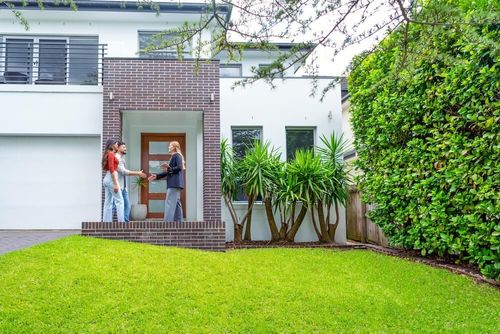Why we like tiered commission rates
Johanna is one of the co-CEOs of OpenAgent. She has over 8 years of experience in the real estate industry through her work at OpenAgent and holds a class 2 real estate license in NSW. Previously, Johanna worked at hipages.com.au, Australia's largest trade marketplace, where she built her experience understanding renovations and home improvements for 7+ years.
Learn more about our editorial guidelines.
One of the most common questions we are asked by our clients is: “what rate of commission should I be paying?” There is no simple answer to that question, as commission rates vary a lot depending on where your property is located, your local market and your personal situation.
The best advice we can give any potential seller is to focus first on the real estate agent that you want to work with, and then negotiate the specifics of the agreement with that real estate agent.
Why? Well, you're far better off with the most qualified real estate agent than the cheapest agent, as their low commission won't guarantee their hard work towards a good sale price for your property.
"...Low commission won't guarantee their hard work towards a good sale price for your property"
A good way to ensure you get the best quality real estate agent working for you, and working HARD for you, is to use tiered commission rates. This is the best way to make sure that your interests are completely aligned with your real estate agent's interests.
Tiered commission rates are the real estate agent equivalent of a bonus system. In short, the rate of commission that you pay depends on the price your property ends up selling for.
A real example of why tiered commission rates can deliver higher returns
We deal with hundreds of agents and property sellers every week, so we often see which commission strategies deliver the highest returns.
We recently came across a property seller who had been impressed with their real estate agent’s credentials after comparing their past sales performance and customer reviews online. The agent offered a standard percentage rate of commission of 1.9% - significantly lower than the other real estate agents he interviewed in the area (who offered 2.0% and 2.2%).
However, the owner was concerned that such a low rate of commission may not provide enough of an incentive to the agent who had a large portfolio of properties to deal with.
After interviewing three real estate agents, the owner had been given a likely selling range of between $830,000 and $880,000. So instead of agreeing to 1.9%, he suggested a tiered schedule of commission rates based on the final sale price, as follows:
- 1.75% for a sale price of below $830,000
- 1.9% for a sale price of between $830,000 and $860,000
- For a sale price between $860,000 and $880,000: 1.9% up to $860,000 plus 2.5% on anything over $860,000
- For a sale price between $880,000-$900,000: 1.9% up to $860,000 and 5% on anything over $860,000
- For a sale price exceeding $900,000: 1.9% up to $860,000 and 10% on anything over $860,000
This structure meant that if the real estate agent was not able to sell within the range he had quoted, he would not be paid the full 1.9%. But if he managed to sell at the higher end of the range or above the range he would get paid more than the 1.9% he quoted.

"This structure meant that if the real estate agent was not able to sell within the range he had quoted, he would not be paid the full 1.9%."
In this way, the property seller was able to make sure the real estate agent would fight hard to get the highest possible price.
How much harder do you think the real estate agent would be prepared to negotiate to make sure the price got over the $830,000 hurdle? And then over $860,000?
The agent accepted the tiered commission rates structure, and the property ended up selling for a price of $890,000. This was a very good outcome for the property seller.
This outcome gave the agent the originally proposed 1.9% ($16,340), but also an extra $1,500 as a result of the 5 percent earned on funds over $860,000 ($30,000). This meant a total of $17,840 was paid to the agent in commission.
Had the flat rate of 1.9% applied to the total sale price, the agent would only have received commission totalling $16,910. By opting for the tiered structure, the agent earned an extra $930.
But if the agent was not able to hit the range he proposed, and sold the property for only $820,000, then he would have only been paid $14,350 (1.75%) instead of $15,580 (1.9%).
By using a tiered commission structure, the owner was able to create a genuine win-win scenario. If the real estate agent was able to create an exceptional selling price, he would be paid an exceptional amount.
"By using a tiered commission structure, the owner was able to create a genuine win-win scenario."
The hidden benefit of working with tiered commission rates
This opportunity to earn extra commission based on the final sale price is very attractive to real estate agents, but this is not the only benefit of using this structure. The hidden benefit is that you're likely to get the most realistic selling range estimate if you use a tiered commission structure.
Why is that? Well a common practice among some real estate agents is to "buy the listing" which is the less-than-ethical practice of estimating at or beyond the upper end of your potential selling range.
Some agents give you an estimate that is more than they think they can sell your property for to entice you to list and sell your property with them. They then rely on being able to "talk you down" later on, once you have already committed to selling with them.
This can lead you to having an unrealistic view, listing with the wrong agent, and ultimately ending up disappointed.
A tiered commission structure favours agents who are giving you a realistic view of the price they might be able to sell your property for. If they set expectations too high, they will not be able to meet the range, nor receive full commission.
"A tiered commission structure favours agents who are giving you a realistic view of the price they might be able to sell your property for."
A real estate agent with a tiered commission structure has to strike the balance between giving you a realistic price range so as to earn full commission, and a high enough range so as to impress you enough to earn the right to sell your property.
This means you will naturally favour the ethical and experienced real estate agents, who are confident in their appraisal and willing to go the extra mile to sell your property for the highest possible price.
How to get started?
We always recommend doing your homework and finding out who are the top real estate agents for you. First and foremost, you need to work with an accomplished agent who can sell your property for its potential.
After you have figured out who you would like to work with, a tiered commission structure can be a very effective way of getting the most out of your agent.
If you can create a situation where your agent is highly incentivised to sell your property for $10,000 or $20,000 more, you will be in a great position to get the best possible outcome.
For further information, read our article on what commission rates to expect when first negotiating with your agent.



